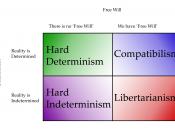When it comes to the philosophy of metaphysics, the doctrines of fatalism and determinism are both closely related doctrines questioning the certainty of events and the existence of free will. Due to the two doctrines being so closely related, there is often confusion as to whether the two overlap and whether one can be a fatalist without being a determinist and more importantly if a determinist can possibly avoid being a fatalist; where I agree with both these scenarios. Despite the similarity between the two, there are certain differences but before jumping to conclusions it is important to correctly define the two doctrines in order to correctly distinguish between the two.
Initially, the doctrine of fatalism holds that any event that occurs is subject to fate or must occur as it was inevitable for it to occur. The fatalist holds the view, that everything that has occurred or will occur is pre-determined and hence the concept of free will is merely illusionary and that the future is always real (similar to Block Theory of Time) and we simply are and will continue to pass through it.
I believe the logical fatalism theory is simply this, and there is no reference or importance placed on factors such as natural laws or the existence of causality. For such factors have no effect on the fatalist argument that relies solely upon the principle of bivalence, which claims that a proposition is either always true or false regardless of its place in time (Ryle, G 1953). Hence, the fatalist believes nothing one can do will alter the truth or falsity of a proposition but rather just verify it, as it is pre-determined. As we can see, fatalism provides no room for the concept of free will to exist - as even what we...


